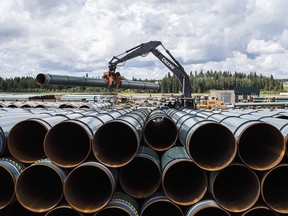Article content
Suncor Energy Inc. says it will be banking on its trading platform to remove middlemen and directly negotiate with new customers to get a “unique” advantage once it starts shipping to additional regions through Canada’s now-operational Trans Mountain pipeline expansion.
The Alberta-based company, which reported net earnings of $1.6 billion, including an all-time high in oilsands production, in the first quarter, said the May 1 start of Trans Mountain Corp.’s new pipeline would increase oil production profits, but that could be partially offset by increased refinery costs.
Article content
“What might make us a bit unique is we are not reliant on third-party trading shops,” Dave Oldreive, Suncor’s executive vice-president of downstream, said. “This allows us to capture the full value of the transaction by transacting directly with customers.”
He added that the company has leased vessels operating in the Pacific Ocean, which will give it an advantage in terms of shipping costs.
The new 1,150-kilometre pipeline is part of an expansion project that twins an existing line built in 1953 connecting Alberta and British Columbia. Together, the two pipelines are expected to deliver about 890,000 barrels of oil per day.
Canada’s heavy crude oil trades at a discounted price compared to the light crude oil from the United States due to factors such as transportation costs, limited market access and quality differences. Analysts and industry insiders expect the Trans Mountain pipeline to reduce the difference in prices since it will make transportation cheaper and open new markets.
Oldreive said he expects crude oil in the pipeline to reach markets in California and Asia. He added that Suncor’s trading offices were working to “strengthen relationships” with those markets so the company can directly negotiate with customers and get better deals.
Article content
“I think it gives us a bit of a competitive advantage,” he said. “In fact, in the first quarter, we delivered diesel off the east coast to Scandinavia, capturing unique quality differentials in that market. Similarly, we have been able to capture quality differentials off the west coast down into Latin America.”
Other oil producers have also said they expect the pipeline to improve conditions for Canadian companies.
Cenovus Energy Inc. on May 1 said it has its eyes set on a “pretty vast market,” and added that Canada needs to build more infrastructure to tackle its decreasing productivity.
Canadian Natural Resources Ltd. on May 2 said the new pipeline creates additional exporting opportunities on the west coast, and Meg Energy Corp. expects Canada’s oil producers to get better prices “for years.”
Suncor reported first-quarter earnings of $1.25 per common share, compared to $1.54 in the same quarter last year. On an adjusted basis, its first-quarter operating earnings of $1.82 billion were higher than the $1.81 billion in the prior year’s quarter.
The company also reported an all-time high in oilsands production of 785,000 barrels per day and its highest-ever first quarter in refining throughput of 455,000 barrels per day.
Article content
Suncor on Tuesday held its annual general meeting, where shareholders were asked to vote on two resolutions, both of which failed to pass.
The first resolution requested that Suncor end its pledge to become a net-zero emitter by 2050, which was rejected by 98.92 per cent of the shares represented at the vote. This proposal was submitted by InvestNow Inc., which said the goal would be costly and could have a negative impact on the company.
The second resolution requested that Suncor provide more details on its climate transition. This was rejected by 88.45 per cent of the shares. This was submitted by Salal Foundation, a non-profit that wanted Suncor to be more accountable for its emissions.
The results of both votes were in line with Suncor’s recommendations.
• Email: nkarim@postmedia.com
Share this article in your social network













